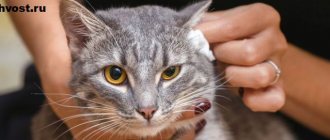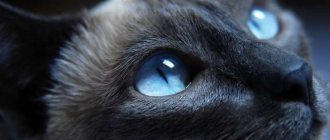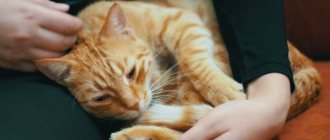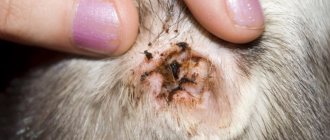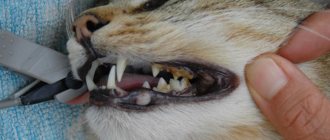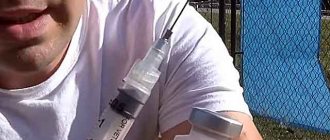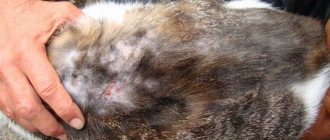Poisoning in domestic cats is not uncommon. No one is insured - neither a cat who constantly walks on the street, nor a pet who has never seen what is happening behind the doors of the apartment. Poisoning in a cat is accompanied by obvious symptoms, and treatment should be started immediately as soon as they appear. You need to know what and how to do in case of poisoning - provide first aid at home or urgently contact a veterinary clinic.
Food poisoning in cats
There are many reasons why a cat can get poisoned, and they are all different. Sometimes poisoning in a cat can occur due to its curiosity, and sometimes due to the inattention, inexperience or negligence of the owner.
The most common food poisoning in cats is:
- spoiled food that has been sitting in a bowl for a long time, especially in a warm room;
- food scraps that the cat may have stolen from the trash can;
- food that people throw on the street;
- feeding with low-quality ready-made food, which is sold by weight, and it is unknown who made it and when;
- food that was not stored under the necessary conditions;
- human food containing dyes, food additives and spices.
The idea that cats love slightly spoiled food is wrong. Cats that eat waste from garbage cans often die from poisoning.
Symptoms of intoxication
Signs of poisoning in pets and their intensity depend on the cause that provoked their appearance, the amount and toxicity of the toxic substance. Poisoning with unsuitable food products is considered the easiest in terms of treatment - with timely detection and treatment, the risk of death is minimal. Symptoms of intoxication with stale food appear after about 6–8 hours. When poisoning with chemicals, plants, or highly toxic substances, symptoms may appear within a few minutes.
Some houseplants, including geranium, cyclamen, aloe, dracaena, begonia and ficus, can cause poisoning in cats
Table: symptoms of poisoning depending on the cause
| Cause | Symptoms |
| Stale or prohibited food | Nausea, debilitating vomiting, apathy, refusal to feed. |
| Poisonous plants | Vomiting, diarrhea, increased general temperature, various heartbeat disorders - changes in the frequency and rhythm of contractions. |
| Isoniazid is a medical drug most often used by dog hunters to exterminate stray animals. | Vomiting - often with blood, profuse foam, severe weakness, loss of coordination, trembling in the paws, difficulty breathing. |
| Other medicines | Symptoms vary depending on the type of drug, but are similar to those of food poisoning - vomiting, diarrhea, weakness, refusal to eat. There is also a sharp drop in temperature. When an animal eats antidepressants or drugs containing narcotic substances, its behavior may change - the pet will be either very excited or, conversely, depressed. |
| Chemicals | Cough, runny nose, increased salivation, loss of coordination, skin irritation, itching, fever, convulsions, paralysis. |
| Rat poison | Severe dehydration, disturbances in the functioning of the central nervous system, internal bleeding, nosebleeds, abdominal pain, blood in the urine, black stools, shortness of breath, trembling. |
Photo gallery: toxic substances
Accidentally eating rat poison will cause dehydration and internal bleeding
Household chemicals are dangerous for animals
Food from the human table should not be given to pets.
All medications must be stored out of the reach of your pet.
A pet on a walk can become a victim of dog hunters who scatter deadly baits in order to destroy stray animals.
Unusual poisonings in cats
Other causes of poisoning may be:
- incorrect dosage of medication when treating any disease or self-medication with drugs that are contraindicated for animals;
- poisons, most often rat poisons. Both baits with poison and rodents that swallow this bait are dangerous for cats;
- poisonous plants;
- chemicals, especially those that emit fumes. These are paints and varnishes, household chemicals, pesticides that are used to treat plants. Poisoning occurs through the respiratory system or mucous membranes;
- overdose of medications against fleas, ticks or helminths;
- insect or snake bites.
Sometimes the effect of toxic chemicals on the body occurs gradually, in which case intoxication is difficult to notice immediately. In a cat poisoned by chemicals, characteristic manifestations may occur when the consequences become irreversible, and in this situation it is not always possible to save the animal.
If a cat has been poisoned by chemicals, then it is necessary, without waiting for symptoms to appear, to contact a veterinary clinic as quickly as possible. In some cases, it may be necessary to give the cat an antidote, and which one can only be determined in the clinic.
There are cases where cat poisoning occurs due to alcohol or chocolate, when people give them for fun. Spending a long time in a room where there is frequent smoking is also dangerous for animals.
Diagnostics
When the first symptoms of poisoning appear, you should contact your veterinarian. The specialist will conduct an initial examination of the animal and prescribe additional research methods.
- A physical examination of the cat may reveal general malaise of the pet, an increase in heart rate and breathing, changes in the oral mucosa, and redness of the conjunctiva of the eyes. Palpation of the anterior abdominal wall in case of food poisoning determines an increase in the size of the abdomen, bloating, and rumbling along the intestines.
- A clinical blood test is prescribed to identify pathological changes. For example, an increase in the level of leukocytes and an acceleration of ESR indicates the presence of an inflammatory process in the body.
- If intoxication is suspected as a result of hemolytic poisons entering the body, a coagulogram is prescribed.
- X-ray of the abdominal organs evaluates the condition of the internal organs. This type of study can reveal the presence of pathological processes in the gastrointestinal tract, heart, lungs, and genitourinary system.
- A study of the stomach contents is carried out to determine the etiological factor of intoxication.
Signs of poisoning
The symptoms of poisoning in cats are varied, but only a few of them may appear. Common signs of poisoning in cats:
- nausea, which is expressed by the pet licking its nose very often, while smacking its lips;
- salivation;
- vomit. It may be mixed with bile or blood, or it may be without impurities;
- diarrhea;
- lack of appetite;
- rapid breathing, often shallow;
- abdominal pain, which may be accompanied by meowing, or may only be noticeable when pressing on the abdomen;
- temperature increase;
- pupil dilation. Sometimes the third eyelid becomes noticeable in poisoned animals.
In addition, the behavior and general condition of the pet changes. There may be lethargy or, conversely, overexcitation. Coordination of movement may be impaired. In severe cases, tremors, seizures, and paralysis may occur.
If symptoms are detected and the cat may have been poisoned, then before you start doing anything at home, you need to make sure of this. Such symptoms may indicate not only poisoning, but also other serious diseases. It is important to find out whether the cat has been poisoned or not as quickly as possible. It is necessary to analyze what could have caused it. If the cause is not found, it is better to immediately contact a veterinary clinic for diagnosis and treatment.
Treatment for poisoning in cats differs from treatment for other diseases with similar symptoms. If you draw the wrong conclusion, you can do harm and waste time. Particular attention should be paid to kittens, especially when the kitten has been poisoned by a large dose of poison.
Causes
On various forums and even at veterinarian appointments, pet owners are often perplexed: where could the disease come from if the animal was provided with the proper care and attention. To which experts respond that Persian and Abyssinian cats show signs of kidney failure much more often than other breeds.
Among other breeds, deficiency is also not uncommon. Among the most common causes of its occurrence, experts call:
- frequent kidney diseases, which are accompanied by inflammation;
- infections and immune diseases;
- poisoning (regardless of type and degree);
- congenital defects in kidney function;
- injuries;
- vascular pathologies;
- urolithiasis disease.
It is not uncommon for renal failure to develop in older cats due to exacerbation of symptoms of unilateral hypoplasia, which was congenital and was not accompanied by any treatment. Such causes of the disease are recorded exclusively in females and, as a rule, do not bring any discomfort at a young age.
Often, an underdeveloped kidney fails, and the body functions only on the second one. The huge load has a destructive effect on the surviving organ, rendering it inoperable in the near future.
In the scientific literature, all causes of kidney failure in cats are divided into several types, which determine how to save the animal in the future. Let's look at them in more detail:
- Glomerular - recorded when the disease was caused by nephritis, nephrosis or severe intoxication of the body.
- Tabular - when failure is a consequence of the blood vessels being clogged with heavy metals, as well as viral diseases and leptospirosis. This group considers cases where the disease arose as a complication after surgery.
- Interstitial - associated with advanced forms of pyelonephritis and vasculitis.
But, along with a clear classification, experts note mixed types and call them the most complex forms, which are very difficult to treat.
This disorder begins to progress against the background of existing pathologies of the urinary tract, as well as due to somatic feline diseases. The main reasons identified by veterinarians are:
- Urolithiasis disease;
- Tumors of kidney tissue;
- Pyelonephritis;
- Diabetes mellitus and other metabolic diseases;
- Pathologies;
- Underdevelopment of kidney tissue.
It is also a common case that it is not possible to detect the cause of the disease even after tests and various types of diagnostics.
What makes poisoning worse?
A cat can only be cured when measures are taken on time. In some cases, intoxication of the body occurs rapidly. This is facilitated by:
- Exhaustion of the body;
- Weak immunity;
- Presence of chronic diseases;
- Age of the animal. Small kittens tolerate poisoning very hard. If the kitten has been poisoned, you should immediately go to the veterinary clinic. The likelihood of death is high, do not self-medicate and waste time. The treatment of a kitten should be entrusted to a specialist.
In addition, the condition of the animal depends on what kind of poison entered the body and in what quantity. The more dangerous the substance, the more of it in the body, the more difficult it is to treat a cat if it is poisoned.
Renal failure syndrome
Yes, yes, renal failure in cats, cats, dogs, people is not a disease, but a syndrome that occurs suddenly.
Nothing portends trouble, but the animal suddenly begins to feel unwell. The owner does not understand what is happening to the animal, how to help it, and why the pet immediately doubled over in pain. What happens to an animal when renal failure syndrome develops? First of all, the kidneys “die”: nephrons (in simple terms, these are kidney cells) actually die, so the function of the organ is not fully performed. As a result, urine production and excretion ceases. But urine is a “product” formed after the kidneys purify the blood.
Agree, if the blood is not cleansed, then it is full of toxic substances. The products of nitrogen metabolism begin to go off scale. This leads to intoxication (self-poisoning) of the entire body, all organs, every cell of the body. The acid-base balance and all types of metabolism are disrupted.
Chronic insufficiency (CRF) develops over a long period of time – up to several years. Most often, this syndrome is recorded in older cats - over ten years of age. And an animal can live with such problems for a long time.
As a result, the animal, without emergency assistance and in a neglected situation, falls into a coma and dies. But why does acute renal failure occur in a cat?
How to help a cat at home with food poisoning
Regardless of what caused the intoxication of the body, a veterinarian should assist the cat in case of poisoning. If possible, you should contact a veterinary clinic as soon as possible. If visiting a doctor is possible only after some time, it is necessary to take measures aimed at reducing the absorption of poison into the blood.
What to do if your cat is poisoned:
- Find out the cause of poisoning;
- Remove the source of poisoning from the pet’s access area;
- Rinse the stomach. To do this, use clean water, which is poured into the cat’s throat using a large syringe without a needle. It is allowed to pour in 250-500 ml of liquid at a time. After this, vomiting is induced by pressing on the far part of the tongue;
- Before washing the stomach, you need to give a sorbent - activated carbon is suitable for this purpose. It prevents toxic substances from being absorbed into the walls of the stomach, taking them onto itself. No more than half of one tablet should be given at a time. It must be crushed, diluted with a small amount of water and poured deep into the throat. Vomiting can only be induced after a few minutes. It is necessary to wait for the sorbent to absorb toxic substances;
- If several hours have passed since the poisoning, you can do an enema to remove toxic substances from the intestines. The volume of liquid introduced into the rectum should not exceed 50 ml;
- To avoid dehydration, your cat needs to be given water. If you refuse water, you should force drink, using a syringe without a needle. You need to drink little by little, with an interval of 15-20 minutes. If vomiting occurs frequently, it will be good if, instead of plain water, you give your pet a saline solution, which helps restore the water-salt balance.
If you are vomiting, you should not use antiemetic drugs. Vomiting is a natural reaction of the body in which harmful substances are removed from the stomach.
Treatment and first aid
If you suspect poisoning, you should take action immediately
in order to provide emergency assistance to your furry pet as soon as possible.
This is especially true for those pets who have weak immunity or are young. A veterinarian should .
However, if this is not possible, then it is recommended to provide your pet with all possible assistance in order to improve its condition. If you cannot call a veterinarian immediately after the poisoning begins, then you can give the cat a little Smecta . It has an enveloping effect. Also, every caring owner should know what to do if poisoned by a particular substance. Cats are difficult to tolerate intoxication
, and therefore you cannot delay treatment.
You can get poisoned anywhere, and you need to have the phone number of the YA-VET veterinary clinic at hand. However, if your furry friend has just recently been poisoned, it is very important to determine what he ate in order to determine first aid tactics
.
- In case of damage by alkaline substances, you should pour a mixture of apple cider vinegar and water into the cat in a ratio of 2 to 1. You also need to add grains of citric acid in small quantities.
- If the fluffy has been poisoned by acid, then it needs to be soldered with water and beaten yolk 1 to 1. It is best to use a syringe without a needle, then you can easily give the animal something to drink.
A small dose of toxins also does not bring anything useful to the cat’s body. It is also very important to induce vomiting . It is necessary to help with minor lesions as follows:
- Salt mixed with water in a ratio of 1 to 4
- Plain water in unlimited quantities
- Hydrogen peroxide solution 1 to 1
It is clear that no self-respecting cat would drink such liquids. You can do this procedure with a soft small enema if you feel unsure about the syringe.
- Having finished cleaning the stomach, the cat owner will be faced with two tasks:
- Prevent your cat from dying from dehydration
- Give the animal a sorbent to drink in order to maintain the animal’s water-salt balance.
Even if after the measures taken it seems that the pet is feeling better, we should not forget that the main threat is left behind. Therefore, the best safety measure would be diagnosis by an experienced veterinarian.
He will tell you how to treat your pet, because cats are very gentle and sensitive creatures. After it gets better, the doctor will recommend following a special diet, during which the poisoned animal will receive easily digestible dietary food.
Cat diet after poisoning during the recovery period
After poisoning and other unpleasant manipulations, you may want to cheer up your pet with treats, but it is better to postpone them until complete recovery.
- During recovery, you need to adhere to the following nutrition plan:
- For the first day, do not feed your four-legged friend at all so that the stomach can rest.
- On the second day you can give a little kefir. The cat does not need to be forced to eat if he does not want to. You can also offer chicken fillet.
- Boiled eggs, unlimited water.
We also recommend paying attention to the fact that liquid food should be ingested within 3 days
while the digestive system is restored and returns to normal.
All this information is advisory in nature.
, since the diet must be prescribed by a veterinarian who monitors the animal throughout its life. It is not difficult to find such a doctor in a veterinary clinic, because only here are the most qualified doctors who love animals with all their hearts under one roof. It is in our veterinary center that doctors regularly improve their skills and attend seminars in order to gain new knowledge on how to treat our furry friends.
First aid for a cat in case of non-standard poisoning
Poisonings other than food poisoning often require medical intervention and the administration of an antidote. Only a qualified specialist can find out which antidote to administer and correctly calculate the dose.
What to do if a cat is poisoned and what first aid to provide:
- When bitten by insects or snakes, apply ice to the bite site. This will narrow the blood vessels and prevent the poison from spreading further throughout the body.
- If the poison gets on the skin, the pet must be washed under running water.
- If an animal has inhaled harmful substances, immediately take it out into fresh air.
- If acid enters the stomach, vomiting should not be caused.
- In case of poisoning by rat poison, it is necessary to find out its composition, and only after that can an antidote be used. If the venom contains an anticoagulant, vitamin K is prescribed intramuscularly; if the venom contains vitamin D3, diuretics are prescribed. If the composition of the poison is unknown, then vitamin K and diuretics are used in combination. Only a veterinarian can prescribe the dosage and treatment regimen, depending on the weight and condition of the animal.
- In case of poisoning with isoniazid (a drug for tuberculosis), which is used by dog hunters, vitamin B6 is used as an antidote.
If the cause of intoxication is rat poison or isoniazid, it is necessary to rinse the stomach and give a laxative, just as for food poisoning.
If a cat is poisoned, then before treating it at home and providing first aid, it is advisable to contact a qualified specialist and clarify what can be used and in what doses in case of poisoning with a specific chemical.
After providing first aid for any poisoning, it is necessary to examine the animal in a veterinary clinic. Your pet may require additional therapy to recover.
Causes of poisoning
Sometimes the cause of cat poisoning is the fault of the pet itself, but still, one should not forget about the person. It also plays an important role in the deterioration of the animal’s condition. Let's figure out what can lead to cat poisoning.
Left food
Sometimes food in a bowl spoils if the owners do not put it in the refrigerator, but leave it for the whole day in a place accessible to the pet. Or a cat may find spoiled food on the table or in the trash can - although this is not typical for felines, their curiosity sometimes takes over, and they cannot deny themselves a delicacy from the trash. Spoiled food is the most common cause of poisoning in cats.
Food picked up on the street can also be a similar reason if your mustache is a street walker.
Poisoning with rat poison
In cities, rodents are often poisoned with rat poison. The essence of its action is that the anticoagulant included in its composition disrupts blood clotting in the person into whose body it has entered. The anticoagulant accumulates (cumulates), so death does not occur immediately, but gradually. Even the slightest wound, any burst vessel leads to unstoppable bleeding, due to which the animal dies.
Poisoning by rat poison in a cat can occur not only due to eating bait with it, but also after eating a poisoned rodent - a mouse, a rat. The symptoms are specific. And if you know them, then rat poisoning in a cat can be easily recognized. And timely treatment will save your pet from a slow and painful (very painful) death.
Medicines
Yes, often an animal is poisoned due to the fault of its owner, who thoughtlessly gives medications to his beloved four-legged friend. An overdose is dangerous, but some drugs are simply prohibited to be given to an animal! And we must not forget about this. Therefore, do not self-medicate. Be sure to go to a veterinarian who will tell you what exactly can be given to your pet, in what dose and how many times a day.
Don't make diagnoses yourself just because a few symptoms are similar. If you just make a mistake in making a diagnosis, and then choose the medications yourself, you risk killing your pet “with your own hands.” Cat drug poisoning is very dangerous! The consequences for the animal are often irreversible (the heart, kidneys, digestive tract, and brain are affected).
Poisonous plants
For the most part, animals, as if on an intuitive level, feel which herbs can be eaten and which ones should not be eaten. However, sometimes, purely out of curiosity, the pet begins to eat houseplants. And they are often not safe, causing poisoning in cats. A caring owner always thinks about the well-being and safety of his mustaches. If necessary, he will read about each of his indoor flowers. And everything that is poisonous or that can harm the animal is removed away.
Household chemicals
There are so many cases when owners do not thoroughly wash off detergents from dishes. Or when bottles, boxes, or bottles of chemicals are left on the floor, where an animal can freely approach them, smell them, lick them, and chew them. Clean the bathtub with bleach, make sure that the cat and dog cannot get into the room, and provide good ventilation. Poisoning in cats can occur not only after a toxin enters the stomach. The poison can be absorbed through the skin, mucous membranes, or inhaled through the lungs.
Other reasons
| Treatment for parasites | If you overdo the dose, you can harm the animal. This also applies to collars (they must be suitable for the age and size of your pet), drops, sprays, and shampoos. You definitely need to watch how and what you use. There are many ways to poison an animal through the skin or lungs. |
| Poor quality food | Cheap or low quality. Maybe they were poorly stored, or pests such as insects or rodents were running around them. In general, if you save on food by buying it for 3 kopecks from someone unknown, you will then have to splurge on treatment if you manage to save the mustache. |
| Insect and reptile bites | Not only plants, but also insect and reptile bites can be poisonous. In this case, you will have to act quickly; without an antidote (that is, an antidote), it will not be possible to save the mustache. |
| Chemicals | Paints, varnishes, solvents, gasoline - all these substances emit vapors that are very dangerous. Don’t forget about fertilizers (especially if you like to tinker around at the dacha, although many fertilizers are also sold for indoor plants). A cat can even get poisoned if it runs through beds that have been treated for pests or diseases. Pesticides, insecticides, herbicides - keep all these away from your pet. |
| Disease | Chronic or long-term poisoning in cats can be the result of a serious illness, such as cirrhosis of the liver. |
Diet for a cat who has suffered poisoning
After medical procedures, you need to take care of what to feed your cat after poisoning. The cat's diet should be gentle and fractional. There is no need to feed the first 1-2 days, you can only give it water. If your pet previously drank milk, it should be excluded for a long time. This should be especially remembered if the question arises about how to feed a kitten that has weakened after poisoning. For babies, milk is replaced with fermented milk products.
What to feed a cat after poisoning:
- dairy products;
- chicken bouillon;
- minced chicken;
- liquid boiled porridge of rolled oats or rice, boiled in water;
- boiled chicken protein.
If your pet previously ate ready-made food, you can buy premium dietary food.
To improve the digestive process, the veterinarian may prescribe special enzymes for the cat.
Cat nutrition for kidney failure
Nutrition for cats with acute renal failure plays an important role. Without a special diet, even drug therapy will not give positive results. It is best to entrust the preparation of the diet to a veterinarian. The diet for cats will be selected individually, just like therapy.
First of all, it is necessary to reduce the amount of protein (there are minimum indicators for healthy animals, but in case of renal failure, protein is given no more than the lower threshold of normal). Phosphorus is also reduced in the diet. But we must not forget about the acid-base balance (pH), so it is better to choose food with alkalizing substances.
Agree, with natural food (porridge, soups) it is impossible to follow all the recommendations, so for the period of treatment it is best to switch to super-premium and holistic-class industrial food. Your pet will be much more willing to eat them than lean food.
How long your cat's life will depend on how quickly you seek help from a qualified veterinarian. Diet is also important. If the animal has acute renal failure, therapy began on time and all recommendations were followed, then the cat will live a long time. Unfortunately, with chronic renal failure everything is much more complicated; it is rarely possible to save a purr.
Treatment must be supplemented with nutrition; this is adjunctive therapy. Because the cat refuses to eat, the body is severely depleted. Therefore, even force feeding is appropriate.
If the test shows a urea level of less than 20 mol/l, feeding very high quality wet food is acceptable. When the condition stabilizes, we can switch to premium dry food.
At 30 mol/liter, STRICTLY a protein-free diet based on sweetened foods and flour products. If the cat is not picky about food, bread, oatmeal pancakes, pasta with the addition of vegetable oil are suitable for her. If she does not accept such food, then canned cat food in diluted form. To support the stomach and digestion - Creon and Mezim.
Mix 100 ml of purified water with the same amount of 2.5% fat milk, add sugar - a tablespoon and potato starch - 1 teaspoon. Boil everything, cool. Beat in a raw chicken egg and 1 crushed Mezim tablet.
Mix the mixture thoroughly and give the cat 5 ml through a syringe every hour. As soon as the vomiting decreases or disappears and the condition improves, you can increase the dose, while reducing the interval between feedings. When the condition normalizes, transfer the cat to wet food.
Treatment of kidney failure in cats must be carried out by a veterinarian. The effect of drugs should be monitored by collecting tests. At home, you will not provide help to the animal - arrogance will be fatal for the pet.
Bring your animal to the clinic regularly for control tests. By noticing the disease at an early stage, you can prevent the degeneration of kidney tissue and get by with supportive therapy. Special control must be provided to animals of the Persian breed.
How to prevent poisoning
If the cat is domestic and does not walk outside, then preventing poisoning is not difficult:
- All chemicals, medications, household chemicals, cosmetics and perfumes must be removed from its access zone. Cabinet doors must have a reliable lock, because some pets can easily open them with their paws.
- You need to pay close attention to your diet and avoid purchasing food that is of questionable production or has expired. If your pet is fed natural food, then you need to be selective in your choice of food, and do not leave food in a bowl for a long time;
- remove indoor flowers from the house whose leaves and stems are poisonous;
- observe the dosage of flea and helminth medications;
- Do not self-medicate for any disease.
If your pet is walking outside, it is more difficult to keep track of him. It is advisable to purchase and keep on hand first aid supplies - laxatives, diuretics, vitamins K and D3, activated carbon. You should remember the veterinarian's phone number so that you can contact him immediately.
Types of poisoning
Depending on the route of penetration of the poison into the animal’s body, poisoning can be:
- food - occurs when a toxin enters the pet’s body through the mouth; intoxication can occur due to the cat eating low-quality or prohibited food products (mushrooms, potatoes, garlic and onions, chocolate and others), poisonous plants, ingestion of medications, chemicals (including including rat poison) and in case of overdose of antiparasitic and flea medications;
Eating some houseplants can cause cat poisoning
- non-food - the animal receives a portion of toxins by contact - through the skin or through the respiratory system - poisoning with carbon monoxide or household monoxide, mercury vapor.
With any type of ingestion, toxins penetrate the blood and spread throughout all systems of the body. Clinical manifestations and the speed at which the intoxication process progresses depend on the type of toxic substance.
An animal can be poisoned by substances released by its own body. These substances, called endogenous poisons, are produced when the pancreas, liver or kidneys malfunction or as a result of exposure to bacteria or viruses.
